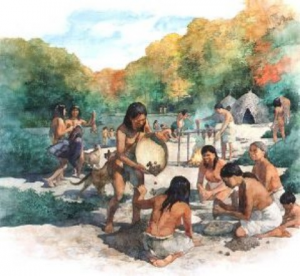First Things First: What Is the Paleo Diet?
 Word is spreading! You’ve probably been hearing more and more about the paleo diet and are wondering, “What is paleo?”
Word is spreading! You’ve probably been hearing more and more about the paleo diet and are wondering, “What is paleo?”
Simply put, the paleo diet is the optimum way of eating based on extensive studies of the eating habits and health of hunter-gatherers before agricultural and animal husbandry came around. Simple enough, right?
Paleo is short for the Paleolithic Era, which refers to the period when our ancestors were hunter-gatherers (about a couple million years ago up until the Agricultural Revolution in 10,000 BC). There are lots of different names for the paleo diet: the caveman diet (although there’s actually not much evidence showing our ancestors lived in caves), the Stone Age Diet (which isn’t really correct either because technically the Stone Age partly covers the Agricultural Age), the Hunter-Gatherer Diet, the Primal Diet, the Ancestral Diet, and the Evolutionary Diet. Yep, a lot of names for such a simple way of eating.
Paleo Eating . . . In a Nutshell
I like simple explanations, so I hope you do to. The basic idea is that modern humans do best eating the foods our ancestors ate for 200,000 years as hunter-gatherers. These guys were eating foods they could hunt or gather in a particular area. Their diets consisted of foods like meat, vegetables, fruits, nuts, and seeds, and a variety of these, as hunter-gatherers wandered from area to area. Simply put, the paleo diet comprises plenty of good fats, moderate amounts of animal protein, and a low to moderate amount of carbohydrates (you can call that the paleo food pyramid—easy!). And, of course, the paleo diet leaves out the foods that came from agriculture and animal husbandry such as dairy products, grains, beans, legumes, potatoes, sugar, and processed foods (no more packaged foods!).
There are many renditions of the paleo diet, and you’ll find different protocols in each one, but the general agreement is that you should eat the foods that are best for you. As you’ll see, the paleo diet is not really a “diet.” It should actually be called the “paleo diet lifestyle” or just the “paleo lifestyle.”
Why Paleo?
 Now why on earth would you want to give up your pasta and ice cream and other favorite foods and even cravings and dive right into the world of paleo?
Now why on earth would you want to give up your pasta and ice cream and other favorite foods and even cravings and dive right into the world of paleo?
The paleo diet is an effective answer for weight loss, improving health, increasing longevity, and optimizing fitness. It can also be an answer for people trying to heal their bodies from autoimmune diseases like celiac disease (which you can read more about on my page on Gluten Free and Paleo).
It’s pretty amazing stuff! According to research, pre-agricultural humans were free of the diseases of the civilized world such as cardiovascular disease, cancer, obesity, and autoimmune diseases. Modern studies, including clinical studies, have shown as well that the paleo diet and the restoration of the lifestyle conditions of our ancestors, such as sleep and exercise, have resolved numerous diseases!
So you mean you don’t have to go through life feeling fatigued, experiencing all the “normal” aches and pains (indigestion, headaches, hormonal issues, and all those other “common” issues), then develop one or more of the many age-related diseases like diabetes or arthritis? Not anymore!
Here’s a look at some of the conditions that the paleo diet has been shown to alleviate or reduce risk of:
- Arthritis
- Asthma
- Autoimmune diseases such as rheumatoid arthritis and multiple sclerosis
- Cancer
- Cardiovascular disease
- Depression
- Diabetes
- Gastrointestinal disease
- Insomnia
- Obesity
- Osteoporosis
- Stroke
Other paleo diet benefits include:
- Cure for acne
- Anti-aging benefits such as fewer wrinkles
- More satisfying sex life
- Higher energy levels
- Absence of common food allergens: peanuts, soy, milk and wheat
- Suitable for people on the gluten-free diet or gluten-free casein-free diet
- Balanced hormones
- Improved stamina
- Mental clarity
Whatever your reason for starting the paleo diet, eating a biologically appropriate diet not only has the power to change your body and your health, but your quality of life. It’s like living like never before.
If you are on medications, eating paleo may be able to help you wean off them if you apply the diet with someone who is knowledgeable and can work with your MD. If you are on psychiatric drugs and would like help getting off of them, I can possibly refer you to someone in your area. I have never seen anyone truly benefit from psychiatric drugs. I have seen many people turn their lives around with proper diet, sleep, exercise, nutrition and a pleasant environment. How can we place babies and kids on psychiatric drugs? Get these kids some nutritious yummy foods and get them outside to play, climb trees, and be a kids. Jeez!
I hope this page has been helpful. If you have any questions or suggestions, email me at Info (at) TinaTurbin (dot) com
Tina Turbin

